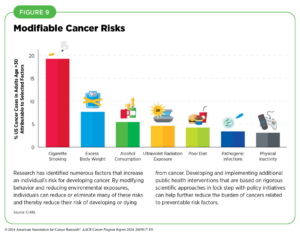It’s a new year with new goals. For many, getting back into a routine after the holidays, sticking to New Years resolutions, and for the state of Michigan, braving the chilly weather, can make starting the year off right a challenge. With 80% of people breaking their New Year’s resolutions by February, pursuing your health goals is not only important for your day-to-day life, but also when trying to prevent cancer. Since 2014, February has been recognized as National Cancer Prevention Month; a time to bring awareness to cancer prevention and how early detection can save lives.
Cancer is not 100% preventable but it is possible to lower your risk. Common risk factors for cancer include:
- Tobacco
- Weight gain
- Alcohol use
- Some viral infections
- Age
- Family history
- Environmental pollutants (radon, lead, asbestos, arsenic, etc.)
- Exposure to radiation

2024 American Association for Cancer Research, AACR Cancer Progress Report 2024
Some risk factors, such as age, cannot be avoided, but there are ways to practice prevention regularly.
- Tobacco use
- Tobacco use is the leading cause of several forms of cancer, including lung, colorectal, breast, and cervical cancer. No tobacco products are considered safe to use, the safest option is to quit tobacco altogether. Our Health Navigators are ready to help you quit smoking! Click here to learn more.
- Healthy diet and exercise
- A good diet and at least thirty minutes of exercise every day are great ways to reduce your risk. Regular exercise can reduce the risk of at least nine different types of cancer, such as myeloid leukemia, breast, prostate, colon, liver, stomach, esophageal, endometrial, and kidney cancer.
- Adjusting your diet by reducing your intake of salt, red meat, processed foods, and alcohol consumption can also help maintain symptoms of chronic disease and boost your mood. A healthy diet is a combination of fruits, vegetables, beans, whole grains, fish, and leaner meats, like chicken and turkey.
- Click here to visit the American Institute for Cancer Research Healthy Recipes webpage.
- Regular visits to the doctor
- Regular visits with your doctor can result in important cancer screenings and vaccinations such as the HPV vaccine. HPV affects everyone. The HPV vaccine can protect you and your loved ones ages 9 to 45 from the following cancers:
- Throat cancer
- Anus cancer
- Cervical cancer
- Penile cancer
- Important screenings your doctor may recommend include breast, cervical, colon, endometrial, lung, or prostate cancer screenings. It is always best to talk to your doctor about any cancer that may run in your family so they can determine what screenings may be best for you.
- Click here to view the American Cancer Society’s cancer screening guidelines.
- Protect your skin from the sun
- Skin cancer is one of the most common types of cancer and can be easily prevented by using sunscreen of at least SPF 30, covering exposed areas of skin with hats and loose clothing, and avoiding tanning beds. Health officials also recommend staying out of the sun from 10am-4pm, and if you must be outside, try to find a shady spot to relax in.
You can also celebrate National Cancer Prevention Month by bringing awareness to the importance of cancer prevention. Whether that means providing support for survivors, attending awareness events, or even sharing your own cancer story, this month represents the resilience of survivors and the important work that is being done to someday find a cure.
Sources:
IDCMS, (2024). February is National Cancer Prevention Month, Illinois Department of Central Management Services. February is National Cancer Prevention Month, 1.7.25.